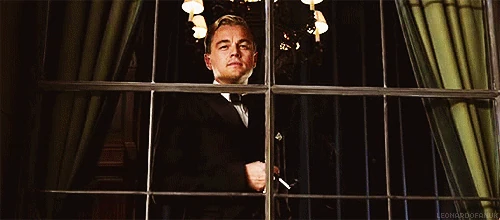Which ironically it kind of did.
"I think he half-expected her to walk into one of his parties...Then he began asking people casually if they knew her, and I was the first one he found." (Fitzgerald 79).
In this passage, Gatsby goes the immeasurable lengths just to rekindle his love with the married Daisy Fay Buchanan.
Seeing that Gatsby threw all of his extravagant gatherings as a gesture of his love to lure Daisy back to him. Spending mass amounts of money on parties he'd hope she'd walk into was a bit of a stretch in my opinion. In the novel, he throws two parties, the one he invites Nick to, to where he coincidentally runs into Ms. Baker, and the second one, to almost celebrate the newly found union between Daisy and Gatsby. Daisy, stringing him along, doesn't seem to care about his grand gestures, while her own husband engages in an affair with his mistress. What Gatsby was doing was half-sweet, and obsessive. He even "bought that house so that Daisy would be just across the bay" (Fitzgerald78), but, clearly love is blindness when it comes to Gatsby concluding the story with his own death and the mere fact that Daisy never musters up the courage to leave her husband for the man she truly loved.
Such a tragedy it seems because it all were for nothing. Gatsby's actions exceed any ideal of love that any other man could match.
This entire novel is a doomed love triangle that ends in the death's of Tom's mistress, Myrtle, and Daisy's lover, Gatsby. The people in the crossfire, Nick and Jordan, help them cheat on each other which shows just how dysfunctional their friendships are, and where their loyalties lie. How heartbreaking it was, showing not the least bit of remorse for what Daisy had done(killing a person and a relationship), and then she fled to avoid dealing with the cleanup.
She went back to him, and he went back to black.

I understand the points you included in your novel and as I read your title I thought it was ironic. I do not know what to feel about Gatsby at this moment.
ReplyDelete